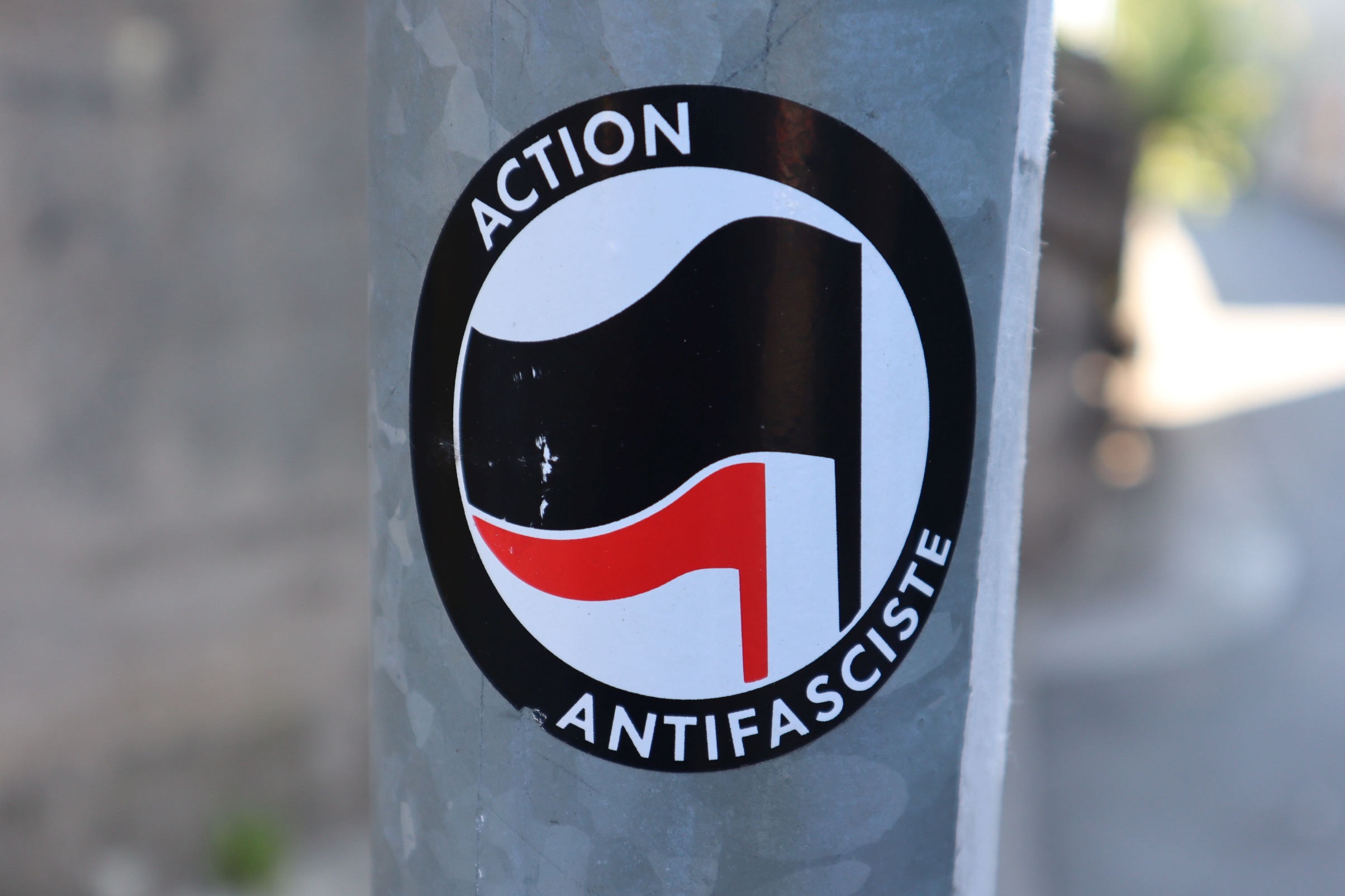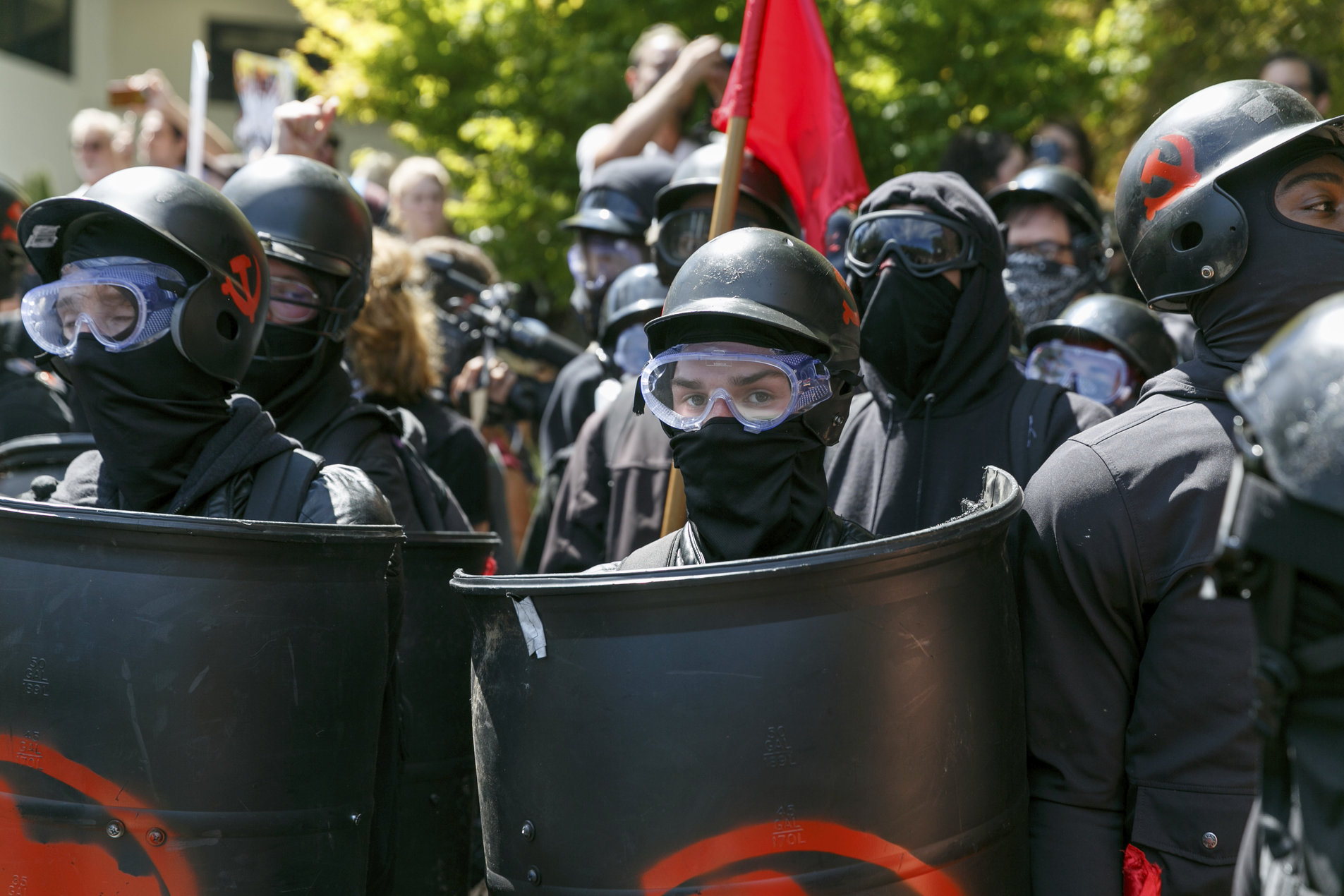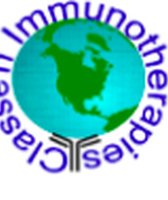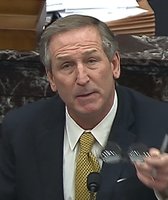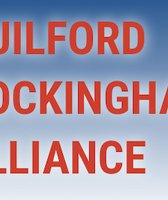Get PolitiFact in your inbox.
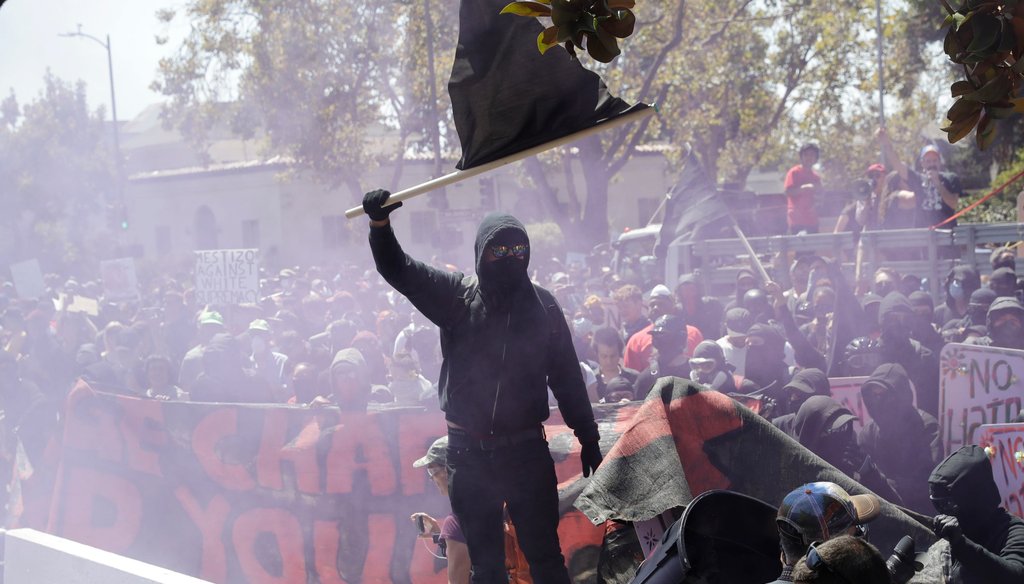
An anti-fascist demonstrator jumps over a barricade during a free speech rally on Aug. 27, 2017, in Berkeley, Calif. (AP)
If Your Time is short
-
Antifa stands for “anti-fascist.” It’s a broad, loosely affiliated coalition of left-wing activists that’s been around for decades, but has had a resurgence since the election of President Donald Trump.
-
Antifa activists include communists, socialists and anarchists who protest against white supremacy and other far-right causes. Sometimes they turn violent, although experts say the bulk of antifa organizing is nonviolent.
-
The Trump administration and social media posts have repeatedly blamed antifa activists for the violent protests that erupted after the death of George Floyd in late May. But government intelligence reports, media reports and experts offer no evidence that antifa played any significant role.
In the weeks since protests erupted after the death of George Floyd, one mysterious word has consistently popped up in press briefings, cable news broadcasts and social media posts: antifa.
President Donald Trump has tweeted several times about the left-wing movement since late May, likening it to "other wacko groups of anarchists." Attorney General William Barr said violent demonstrations appeared to have been planned by "far-left extremist groups and anarchic groups using antifa-like tactics."
Meanwhile, conservative outlets like Fox News and the Washington Times have aired similar claims about antifa. Search interest in the movement spiked in early June, and unsubstantiated theories about antifa were among the most popular pieces of misinformation about the protests, according to the New York Times.
But what is antifa — and why is it suddenly all over the press and our social media feeds? PolitiFact investigated.
"Largely it’s become the in-vogue, far-right bogeyman," said Mark Bray, a historian and part-time lecturer at Rutgers University.
Do you have a question for us? Email us at [email protected], and we’ll try to answer it. Put "Ask PolitiFact" in the subject line.
What is antifa?
Antifa stands for "anti-fascist." It’s a broad, loosely affiliated coalition of left-wing activists that’s been around for decades. It has had a resurgence since the election of President Donald Trump.
In "Antifa: The Anti-Fascist Handbook," Bray traces the modern antifa movement to German and Italian leftist groups that fought proto-fascist gangs following World War I.
"Antifa" takes its name from Antifaschistische Aktion — "anti-fascist action," in English — a phrase that the Stalinist Communist Party of Germany adopted in 1932, as the Nazis were gaining power. The party also adopted the logo that is now commonly associated with antifa groups. The symbol combines the red flag of the 1917 Russian Revolution and the black flag of 19th-century anarchists.
"Antifaschistische Aktion aimed ‘to provide a framework in which people from all walks of life could be brought together in loose coalition to fight economic, social, and legal repression, and above all a basis on which Social Democrats and Communists could join in self-defense against the Nazis," Bray wrote in his book.
An anti-fascist sticker in Frankfurt, Germany. (Shutterstock)
While the political context has changed, that framework still applies to the modern antifa movement.
In the United States, antifa groups played a role in organizing protests against Trump’s inauguration. The movement regained attention after groups counter-protested white nationalists in Charlottesville, Va., in August 2017. The movement has no leaders and is organized into autonomous local groups.
"It’s a little bit like feminism," Bray said in an interview. "There are feminist groups just like there are antifa groups, but neither feminism nor antifa is a group."
Antifa groups use social media and encrypted apps to target right-wing activists and communicate with one another. The oldest antifa cell is Rose City Antifa in Portland, Ore., with similar organizations in several other American cities.
Antifa activists are "predominantly communists, socialists and anarchists who reject turning to the police or the state to halt the advance of white supremacy," Bray wrote in a 2017 column for the Washington Post. They often wear black clothing or bandannas over their faces to stay anonymous in crowds.
Have antifa activists used violence in the past?
Yes. While experts say most antifa organizing is peaceful, the movement does sometimes turn to violence to push back against right-wing activists.
During the 2017 "Unite the Right" rally, hundreds of white nationalists and neo-Nazis marched with torches through Charlottesville, home of the University of Virginia, after the City Council voted to remove a statue of Confederate Gen. Robert E. Lee. The demonstration turned violent when white nationalists clashed with counterprotesters. A 32-year-old woman, Heather Heyer, died after an Ohio man drove a car into the crowd, injuring 19 others.
Among the counterprotesters — who included racial justice activists, clergy and Charlottesville residents — were antifa organizers. Pepper spray was the weapon of choice on both sides of the demonstration. A few members of a group called the Redneck Revolt, which describes itself as an "anti-racist, anti-fascist community defense formation," had guns, but white nationalists were more armed, according to BuzzFeed News.
Antifa activists have participated in other violent protests across the country as well.
Antifa counter-protesters prepare to clash with Patriot Prayer protestors during a rally in Portland, Ore., on Aug. 4, 2018. (AP)
In spring 2017, antifa activists broke windows and set fires in Berkeley, Calif., to protest the appearance of right-wing provocateur Milo Yiannopoulos at the University of California. More clashes erupted at rallies later that year, during which some antifa activists attacked right-wing demonstrators.
In fall 2017, hundreds of demonstrators protested against a demonstration planned by the right-wing group Patriot Prayer in Portland. Some antifa activists lit smoke bombs and threw objects at police. The scuffle came months after Portland’s annual Rose Festival parade was canceled due to threats of violence against GOP marchers.
The reason that antifa activists sometimes use violence is "rooted in the assumption that the Nazi party would never have been able to come to power in Germany if people had more aggressively fought them in the streets in the 1920s and ’30s," according to the Anti-Defamation League, a Jewish non-governmental organization.
Experts say most organizing is not rooted in physical violence. Antifa activists use other tactics to achieve their aims, such as exposing the private information of online extremists and trying to get right-wing rallies canceled.
"There’s all sorts of different ways that often succeed without even having to get to confrontational levels," Bray said. "They don’t shy away from it, but it can be seen as the last step in a chain of options to stop far-right organizations, and usually earlier steps on that chain are successful without needing to get to that point."
Why have they been in the news lately?
After the death of George Floyd in Minneapolis police custody in late May, several protests across the country turned violent. Since the antifa movement has a left-wing bent and a track record of violence, experts say it was an easy scapegoat for the chaos.
The Trump administration has repeatedly blamed antifa activists for picking fights with police and looting businesses. On May 30, Trump tweeted that "antifa and the radical left" were to blame for the violence in Minneapolis. Attorney General Barr made a similar allegation.
"Unfortunately, with the rioting that is occurring in many of our cities around the country, the voices of peaceful protests are being hijacked by violent radical elements," Barr said. "In many places, it appears the violence is planned, organized, and driven by far-left extremist groups and anarchic groups using antifa-like tactics."
Neither Barr nor Trump offered public evidence that antifa activists were responsible for the unrest in Minneapolis and elsewhere. But a day later, Trump doubled down, promising to label the movement as a "terrorist organization." (National security experts say Trump does not have that authority.)
Those comments came on the heels of a barrage of online misinformation about antifa’s connection to protests against police brutality.
On May 31, a now-suspended Twitter account posing as an antifa cell published a tweet that made it look like left-wing protesters were moving into white residential areas. We rated that claim False — and the account was actually owned by a white nationalist group.
In the days that followed, several other false or unproven rumors took off on social media:
-
Antifa threatened to vandalize houses in Seattle if the owners didn’t give them food and supplies. (False)
-
Antifa planned to raid a wealthy neighborhood in Raleigh, N.C. (False)
-
Antifa staged bricks at protests across the country to stoke violence. (Mostly False)
-
Antifa murdered a man at a protest in Portland. (False)
-
Antifa planned a riot in Chesterfield County, Va. (Hoax)
The tactic of blaming antifa activists for acts of violence isn’t new. Some websites falsely blamed the movement for the 2017 massacre in Las Vegas and even the death of Heyer in Charlottesville.
"For some people, it is easier to believe that a shadowy group of people are trying to undermine society than it is to accept that Americans are so angry and so fundamentally outraged at the state of the country, that they are willing to take to the streets," said Oren Segal, vice president of the Center on Extremism at the Anti-Defamation League, in an email.
What has antifa actually done at the protests?
It’s difficult to say for sure, but there’s no evidence that antifa activists played a significant role in violent protests and looting following Floyd’s death.
Thousands of people have been arrested amid the nationwide demonstrations, not all for acts of violence. The number has included curfew violators, working press and others.
It isn’t possible to know how many were motivated by any particular political belief or association. But government intelligence reports, media reports and experts offer no evidence that antifa played any significant role.
"While their presence at some counter-protests against events held by white supremacists and right-wing extremists over the years has been marked by physical confrontations and violence, there is no evidence that antifa supporters have organized the recent protests in response to the murder of George Floyd, or that they have coordinated any violence at the protests," Segal said.
RELATED: Florida congressional candidate blames antifa for violence without evidence
Other experts and fact-checkers back up that assessment. So do arrest reports.
The New York Times analyzed dozens of federal arrest reports related to recent protests. The newspaper found no connection between the arrests and antifa groups. Several other media outlets came to similar conclusions.
Given the lack of evidence, experts say pinning violent protests on antifa activists serves to distract from the larger conversation about police brutality.
"Antifa is just the latest placeholder," Bray said. "Maybe 10-15 years ago it was radical environmentalists. If you go back further, it’s communists, it’s Black Panthers."
"It serves the purpose of being a bogeyman because it’s everywhere — and nowhere."
Our Sources
ABC News, "What to know about the violent Charlottesville protests and anniversary rallies," Aug. 8, 2018
Anti-Defamation League, "Who are Antifa?" accessed June 30, 2020
"Antifa: The Anti-Fascist Handbook," by Mark Bray
BuzzFeed News, "Here’s What Really Happened In Charlottesville," Aug. 24, 2017
Center for Strategic and International Studies, "Who Are Antifa, and Are They a Threat?" June 4, 2020
Congressional Research Service, "Are Antifa Members Domestic Terrorists? Background on
Antifa and Federal Classification of Their Actions," June 9, 2020
The Daily Beast, "‘Antifa’ Is Literally Never Mentioned in the First Prosecutions of Protest Violence," June 5, 2020
Deutsche Welle, "Trump's 'antifa' accusations spark debate in Germany, the movement's birthplace," March 6, 2020
Email interview with Oren Segal, vice president of the Center on Extremism at the Anti-Defamation League, July 1, 2020
Interview with Mark Bray, historian and part-time lecturer at Rutgers University, June 30, 2020
The Mercury News, "Who’s behind this weekend’s right-wing rally at Crissy Field?" Aug. 23, 2017
The Nation, "The FBI Finds ‘No Intel Indicating Antifa Involvement’ in Sunday’s Violence," June 2, 2020
NBC News, "White nationalist group posing as antifa called for violence on Twitter," June 1, 2020
The New Yorker, "An Intimate History of Antifa," Aug. 22, 2017
The New York Times, "Behind Berkeley’s Semester of Hate," Aug. 4, 2017
The New York Times, "Federal Arrests Show No Sign That Antifa Plotted Protests," June 11, 2020
The New York Times, "Misinformation About George Floyd Protests Surges on Social Media," June 1, 2020
The New York Times, "Who Were the Counterprotesters in Charlottesville?" Aug. 14, 2017
NPR, "No Sign Of Antifa So Far In Justice Department Cases Brought Over Unrest," June 9, 2020
Pacific Standard, "Doxx Racists: How Antifa Uses Cyber Shaming to Combat the Alt-Right," Nov. 2, 2017
Politico, "Barr threatens to bust 'far-left extremist groups' in Floyd unrest," May 30, 2020
PolitiFact, "Charlottesville hit-and-run driver was anti-fascist activist, Internet post claims," Aug. 14, 2017
PolitiFact, "Hoaxes, fake news about the Las Vegas massacre," Oct. 2, 2017
PolitiFact, "How George Floyd protests evolved in 5 major cities," June 10, 2020
PolitiFact, "In Context: President Donald Trump’s statement on ‘many sides’ in Charlottesville, Va.," Aug. 14, 2017
PolitiFact, "Suspended Twitter account fans misinformation about antifa, George Floyd protests," June 1, 2020
PolitiFact, "Trump wants to designate antifa as a terrorist organization, but lacks legal authority for it," June 1, 2020
Reuters, "Little evidence of antifa links in U.S. prosecutions of those charged in protest violence," June 9, 2020
Time, "What Is Antifa? Anti-Fascist Protesters Draw Attention After Charlottesville," Aug. 14, 2017
Tweet from Donald Trump, May 30, 2020
Tweet from Donald Trump, May 31, 2020
Tweet from Donald Trump, May 31, 2020
Vice, "California Anti-Fascists Want Racists and the Trump Administration to Be Afraid," May 9, 2017
Vox, "Antifa, explained," June 8, 2020
The Washington Post, "Among more than 400 arrested during protests in the District, most cases involve curfew violations and burglary," June 16, 2020
The Washington Post, "Antifa, far-right protesters clash again in Portland, disrupting peaceful rallies," Sept. 11, 2017
The Washington Post, "Black-clad antifa members attack peaceful right-wing demonstrators in Berkeley," Aug. 28, 2017
The Washington Post, "‘Carnage,’ ‘radicals,’ ‘overthrow the government’: How Fox and other conservative media cover the protests," June 2, 2020
The Washington Post, "Portland rose parade canceled after ‘antifascists’ threaten GOP marchers," April 27, 2017
The Washington Post, "Who are the antifa?" Aug. 16, 2017
The Washington Post Fact Checker, "Who caused the violence at protests? It wasn’t antifa." June 22, 2020
The Week, "48 Hours in Charlottesville"

